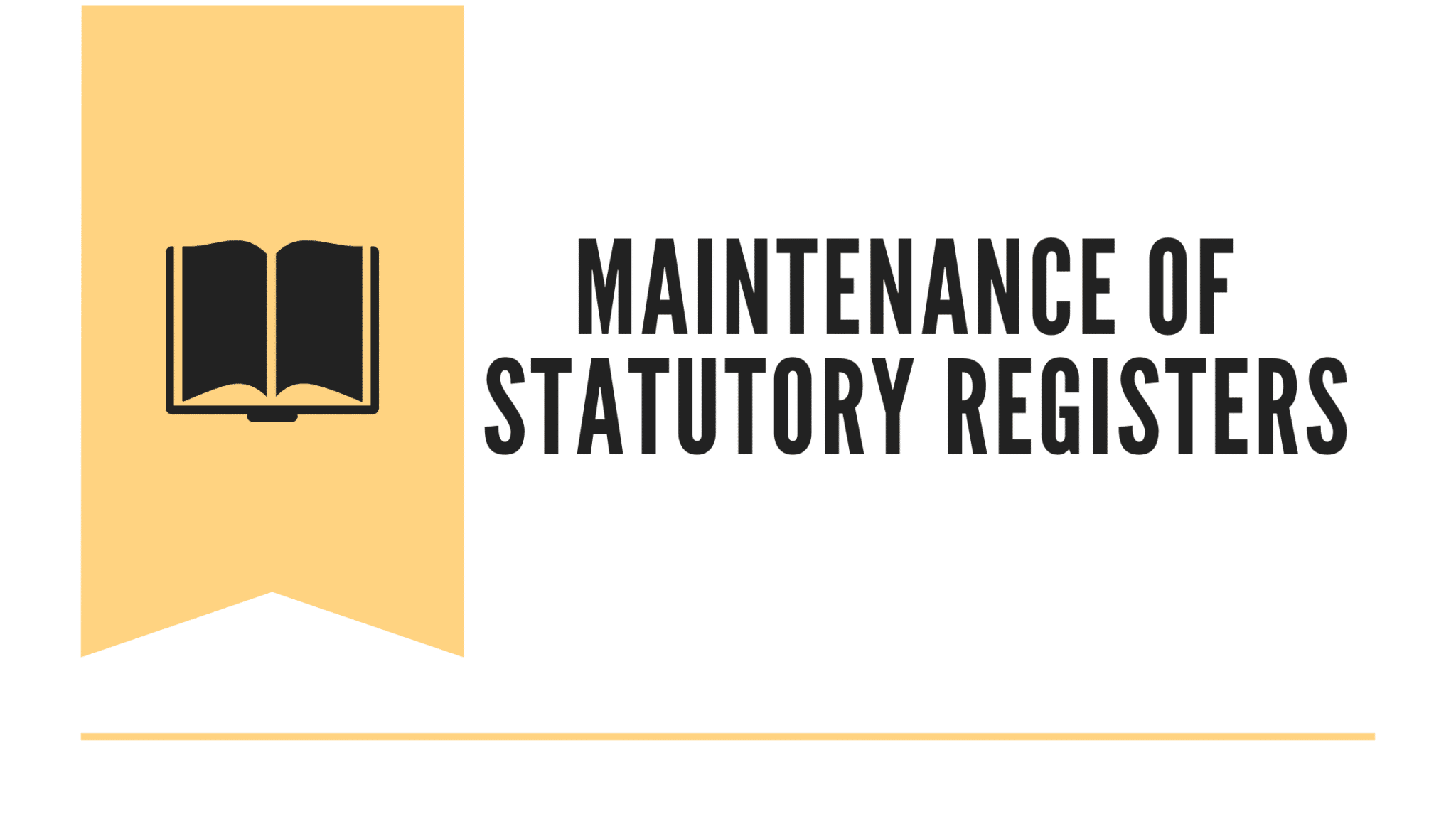Statutory Registers are the Registers that contains the specific record of the Company’s Directors, Shareholders/Members, Loans & Guarantees, Deposits, Shares etc., and are placed at the registered office of the Company.
The Companies Act 2013, requires all businesses to keep and update their records. The company must keep the documents and statements that provide an accurate and realistic picture of the organization’s state of affairs in its registered headquarters for each FY (financial year). It must include all of its subsidiaries and other locations.
The law also clarifies transactions at the company’s registered offices and branches. These accounts should be kept on an accrual basis, using a double-entry bookkeeping system.
Most businesses keep their statutory registers in a loose-leaf binder or bound book, but they can be kept in any format, such as a computer record. According to the Companies Act of 2013, every company is required to submit these records to the ROC (Registrar of Companies) within specific time limits and pay the prescribed fees.
Any member, debenture holder, other security holders, beneficial owner, or other people may take extracts from any register, index, or return without payment of any fee; or require a copy of any such register, entries therein, or return upon payment of any fees as may be prescribed.
Registers to be maintained under the Companies Act, 2013
1. Register of Members
Every company is required to keep and maintain the following registers for its members:
- Register of the members separately for the equity shares and preference shares.
- Register for the debenture holders.
- Register for other security holders.
The registers must include a name index. Furthermore, if a company lacks share capital, the member’s register must include the following information for each member:
- Name, address, email, PAN, UIN, CIN, Occupation, Nationality Name of the Father/Mother/Spouse,
- Date of membership commencement,
- Date of membership termination,
- Other details that may be required.
2. Register of Directors and Key Managerial Personnel
The Companies Act of 2013 requires every company to keep a register at its registered office containing the names of the directors and KMP (Key Management Personnel), as well as details of the securities held by them in the company or its subsidiary, holding associate companies, or subsidiary of the company’s holding company. According to Rule 17 of the Companies (Appointment and Qualification of Directors) Rules, 2014, the following information must be kept in a register at the registered office of a company:
- DIN (Director Identification Number)
- Name and surname
- Any previous name or surname
- Names of the father, mother, and spouse
- Birthdate
- Nationality (including, nationality of origin)
- Residential address (both current and permanent)
- The date of the board resolution that made the appointment
- Occupation
- Appointment and reappointment dates
- Date of resignation and reasons for resignation
3. Register of the Deposits
Every company that accepts deposits must keep one or more registers for deposits accepted and/or renewed at the registered office for a period of eight years. Such a period must begin with the FY (financial year) in which the entry in such a register was made. In the case of depositors, such a register must include the following information:
- Depositors’ names, PANs, and addresses;
- Guardian information (for minors)
- Specifics about the nominee;
- Deposit receipt number
- Interest rate
- Duration of such deposit
- Repayable date
- The interest payment deadline
- The due date for interest payment
- Specifics about deposit insurance
- Details of the charge/security created
- Additional information about the deposit
All entries in this register must be authenticated by the company’s director, secretary, or other officers who are authorised to do so.
Sections 73 and 76, together with Rule 14 of the Companies Act (Acceptance of Deposit) 2014 Rules-
- The company must keep a record of all deposits accepted or renewed.
- Entry must be made within 7 days of the receipt’s issuance, as duly authenticated by the director and Company Secretary, or any other person authorized by the Board.
- The register must be kept at the company’s registered office.
- The register must be kept for at least eight years from the financial year in which the most recent entry is made.
4. Register of Charges
A charge registers in Form No. CHG 7 must be kept by a company. This register must include details of charges registered with the registrar on assets, property, companies, or undertakings, as well as specifics of property acquired and subject to charges, as well as specifics of modifications or satisfaction of any charge.
The register of charges must be kept permanently at the registered office of the company; however, the instrument that created the charge must be kept for 8 years from the date of satisfaction of the charge by the said company.
5. Register of Renewed and Duplicate Share Certificates
- A company may issue a duplicate share certificate or renew the existing certificates on the happening of certain events.
- Particulars of each of the share certificates issued in exchange for certificates that have been consolidated or subdivided, or in replacement of certificates that have been mutilated, defaced, worn out, or decrepit, or where cages on the reverse have been duly utilized for recording transfers OR In place of certificates that have been destroyed or lost.
- Must be recorded in a Register of Renewed and Duplicate Share Certificates, which must be kept.
- The company specifies against the name of the person to whom a certificate has been issued, the date of issue, and the number of certificates instead of which a new certificate has been issued, as well as the required changes specified in the Register of Members by appropriate cross-references in the “Remarks” column.
- When keeping such a register, it must be kept permanently and in the custody of the company secretary or any other person authorized by the company’s Board.
- All entries in this register must be authenticated by the company secretary or another person authorized by the company’s Board of Directors.
- Such a register must be kept at the registered office of the company or in a place where the Register of Members is kept.
6. Register of Employee Stock Options
According to the provisions of the Companies Act of 2013, a company must keep a Register of Employee Stock Options in Form No. SH.6 and enter the particulars of an option granted in it. Such a register must be kept at the company’s registered office or, at the discretion of the board, at another location.
The entries in this register must be authenticated by the company secretary or another person authorized by the company’s Board of Directors.
7. Register of Shares/Other Securities Bought Back [Register of Buy-Back]
According to the Companies Act of 2013, a company must keep a register of shares and other securities bought back in Form SH 10. The following information must be included:
- The date on which the special resolution authorizing the buy-back of securities was passed.
- The date of the Board’s approval
- The number and price of shares or other securities that have been authorized for buyback
- Dates of the buy-back offer’s opening and closing
- The date the buy-back was completed
- Description of the company’s bought-back shares or other securities
8. Books of Account
Companies Act, 2013 requires every company to keep and maintain books of accounts and relevant documents, as well as financial statements for each fiscal year that provide a true and fair picture of the company’s state of affairs, including its branch offices and other offices, at its registered head office.
The provisions also require an explanation of transactions affecting both registered and branch offices and such books must be kept on an accrual basis and using the double-entry bookkeeping system.
Books of Account must be kept and preserved for at least eight financial years.
A director of the Company may inspect the books of account and other books and papers.
Conclusion
The proper maintenance of statutory registers for a well-functioning organization is important for keeping track of and registering its efficient and smooth operation. It ensures the smooth functioning of the company’s operations. The Company Act of 2013 mandates the electronic maintenance of the statutory register and book of accounts for all relevant documents and financial statements for each financial year. As it represents the fairness of the company’s situation in its offices and branches.
Non-maintenance of statutory registers may attract a penalty imposed on the Company and each Officer in Default. There will also be a penalty, per day if the default continues.
Registration Arena is the expert hub that can help you with the Maintenance of the Statutory registers making it easier for you! For more details call us at 8600544411 / 8600544422.







